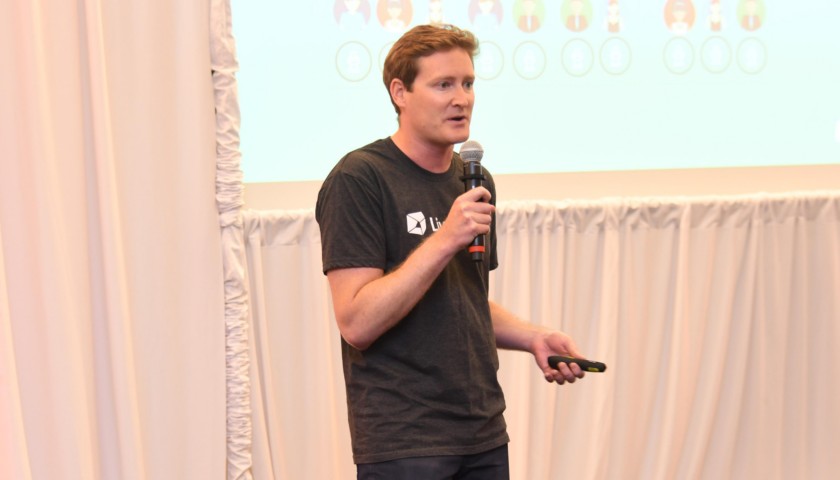Exclusives

LiveTiles Exec: Companies Should Focus on Intelligent Transformation to be Successful
Story Highlights
NEW YORK — Most organizations are going through some sort of digital transformation to allow them to better compete in their market, but organizations really need to focus on “intelligent transformation” if they want to be successful, according to Daniel Goss, VP of Innovation & Experience at LiveTiles.
“I would argue that we have been digitally transforming for many, many years” – even since the 1990s, before the arrival of smartphones, he said July 24 during a session called “From Digital Transformation to Intelligent Transformation” at the Smart Content Summit East event, part of the Media & Entertainment (M&E) Day at the Microsoft Conference Center.
The 2018 M&E Day also included Content Protection Summit East and Entertainment Production in the Cloud (EPIC) conference tracks, providing M&E technology teams valuable insights into the creation, production, distribution, security and analysis of content.
Intelligent workplace software company LiveTiles started about three years ago and is focused on helping companies undergo an intelligent transformation, Goss told the summit. Its intelligent workplace software enables customers to create modern online experiences tailored to their unique needs and enhanced by artificial intelligence (AI), according to its website.
“The old services company that we ran a number of years ago [handled] around about 800” digital transformation projects “over about 10 to 12 years, and we saw a lot of different outcomes,” Goss told the summit. “We still see a lot of digital transformation projects now and I think it’s become a real buzzword … that you need to be going through this transformation,” he said.
But an intelligent transformation is more important, he stressed. One example of what LiveTiles offers to help its customers achieve that is LiveTiles Bots, an intuitive web-based tool that clients can use to create customizable virtual assistants.
After asking how many attendees had a personal assistant, he said: “I wish I had a personal assistant … . Why shouldn’t everyone have a personal assistant to help us do” mundane tasks “to free up our time to be spending on more high-value tasks?” He asked attendees to imagine a time when “everyone in the business had a personal assistant,” which he said, “can be through a bot, a conversational user interface or Cortana or through voice-to-text tools.” Cortana is Microsoft’s virtual assistant.
But one challenge that can arise is when a bot doesn’t do what we want it to do, Goss noted, asking rhetorically: “Do you go speak to the bot or the person who owns the bot?” A bot, after all, isn’t like a human employee.
“So, we’re starting to actually open up some pretty interesting questions around the proliferation of bots in an organization in the enterprise — how they’re being managed, how they’re being governed, and actually how they’re providing value” to a business, Goss said.
We may reach a time when each company has an “army of bots” that could include an expenses bot and a password reset or assistant bot, he noted, adding: “Before you know it, you might have dozens, hundreds or even thousands of bots in your enterprise, and that’s throwing up a few challenges.”
LiveTiles is exploring how we can manage all those bots in an organization and “make sure that they’re constantly adding value,” and also studying what you can do when having problems with bots, as well as the training and governance aspects of bots, he said.
He cited a Gartner projection that, by 2021, we will spend more time conversing with bots than our spouses, telling the summit that’s “a little bit frightening” but makes sense when you factor in all the time many of us spend working.
“We’re seeing a lot of them fail,” he said of bots, noting he’s experienced many such failures with bots when using the Internet, such as an insurance company that forced him to try to buy the wrong insurance.
Failed online searches frustrate the hell out of people, but frustration sets in much quicker when dealing with bots, he said, adding: “I can almost guarantee that if you have one or two failed experiences through a bot, it’s very, very hard to encourage your employees [and] your customers to start using some of these tools.”
But there are so many benefits that bots can provide to a company, such as the ability to reduce staffing costs for overnight call centers because bots can answer most questions, he said.
He went on to say the three things that he’s seeing customers have an increased need for are deep personalization — a “proactive and predictive” approach to how employees are consuming workplace tools, such as the handling of expense reports; Robotic Process Automation (RPA) that takes on boring, low-value tasks to free up humans to provide more value with more high-value tasks they’re more engaged in; and data and analytics embedded in everything they do.
The 2018 Media & Entertainment Day was presented by Microsoft, with sponsorship from IBM Watson Media, Amazon Web Services, IBM, LiveTiles, Microsoft Azure, NAGRA, NeuLion, Ooyala, EIDR, GrayMeta, MarkLogic, Qumulo, Avid, Cloudian, SoftServe and TiVo. The event was produced by the Media & Entertainment Services Alliance (MESA), the Content Delivery & Security Association (CDSA), the Hollywood IT Society (HITS) and the Smart Content Council.
Click here for audio of the LiveTiles presentation or click here for the presentation slide deck.









